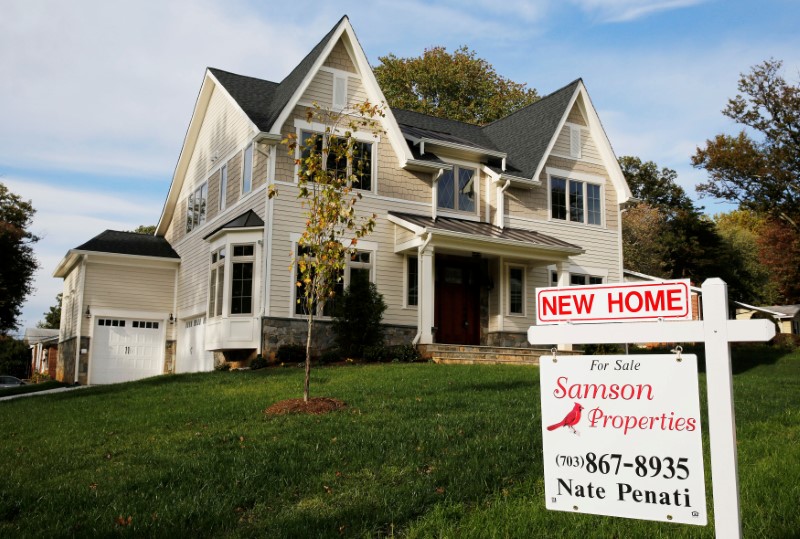By Lucia Mutikani
WASHINGTON (Reuters) - U.S. homebuilding fell to a one-year low in September as Hurricanes Harvey and Irma disrupted the construction of single-family homes in the South, suggesting housing probably remained a drag on economic growth in the third quarter.
The report on Wednesday from the Commerce Department also showed a decline in building permits, raising concerns that the housing market recovery was stalling. Homebuilding and sales are well below their peaks before the housing bubble burst in 2006.
"Residential construction should be a hefty drag on third-quarter GDP growth," said Michael Gregory, deputy chief economist at BMO Capital Markets in Toronto. "Housing activity has shifted from leading the economic expansion to now just following it, at best."
Housing starts decreased 4.7 percent to a seasonally adjusted annual rate of 1.127 million units last month, the Commerce Department said. That was the lowest level since September 2016 and marked the third monthly decline in starts.
Groundbreaking tumbled 9.3 percent in the South to the lowest level since October 2015, with single-family homebuilding in the region plunging 15.3 percent to more than a one-year low. The South, which was pummeled by Harvey and Irma, accounts for almost half of the nation's homebuilding.
Building permits fell 4.5 percent to a rate of 1.215 million units in September. Permits in the South dropped 5.6 percent. The Commerce Department said the areas in Texas and Florida impacted by the storms accounted for about 13 percent of U.S. building permits in 2016.
"September's drop in starts underscores the importance of Florida and Houston," said Mark Vitner, a senior economist at Wells Fargo (NYSE:WFC) Securities in Charlotte, North Carolina.
Economists had forecast housing starts falling to a rate of 1.175 million units last month and building permits slipping to a rate of 1.250 million units.
The PHLX index of housing stocks (HGX) was flat, underperforming a broadly firmer U.S. stock market, and shares in the nation's largest homebuilder, D.R. Horton (N:DHI), fell 0.4 percent.
The dollar (DXY) rose marginally against a basket of currencies while U.S. Treasuries fell.
LABOR SHORTAGES LOOM Even before the storms struck, residential construction had almost stagnated this year amid shortages of land and skilled labor as well as rising costs of building materials.
Investment in homebuilding contracted at a 7.3 percent annualized rate in the second quarter, the steepest drop in nearly seven years. As a result, housing subtracted three-tenths of a percentage point from gross domestic product in the April-June quarter.
Housing market fundamentals, however, still remain solid.
Unemployment is at more than a 16-1/2-year low of 4.2 percent, wages are rising steadily and mortgage rates remain close to historic lows. A report from the Mortgage Bankers Association on Wednesday showed applications for loans to buy a house rose 4 percent last week from a week earlier.
Economists expect housing starts to rebound in the fourth quarter, but they caution that rebuilding in the areas devastated by the hurricanes could pull scarce labor away from other parts of the country and limit gains. The reconstruction effort is also pushing up prices of building materials.
Rebuilding after fires destroyed homes in parts of California was also expected to worsen labor shortages and drive up the cost of materials. A survey on Tuesday showed confidence among homebuilders rising to a five-month high in October, though concerns about labor and land shortages lingered.
Single-family homebuilding, which accounts for the largest share of the housing market, fell 4.6 percent to a rate of 829,000 units in September. That was the lowest level since May.
Groundbreaking on single-family housing projects has slowed since vaulting to near a 9-1/2-year high in February. Single-family starts rose in the Northeast and Midwest last month and hit more than a 10-year high in the West.
Last month, starts for the volatile multi-family housing segment fell 5.1 percent to a rate of 298,000 units.
Single-family home permits rose 2.4 percent. Permits, however, continued to lag starts, suggesting single-family homebuilding will probably not rebound strongly.
Permits for the construction of multi-family homes dropped 16.1 percent. Despite the drop, permits continued to outpace starts, a positive sign for future multi-family construction.
"We expect starts and permits to be relatively flat for the remainder of the year before rebounding strongly with the spring selling season in early 2018," said Scott Volling, principal at PwC in Atlanta.

For graphic on U.S. mortgages, click: http://tmsnrt.rs/2s0Nzco